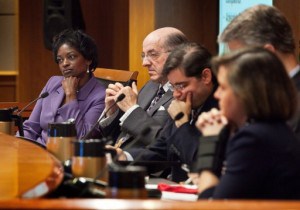 As expected, the Federal Communications Commission today voted 3-2 along party lines to move forward with a Notice of Inquiry on Chairman Julius Genachowski’s proposed “third way” of “light touch” regulation to restore the agency’s authority over broadband matters.
As expected, the Federal Communications Commission today voted 3-2 along party lines to move forward with a Notice of Inquiry on Chairman Julius Genachowski’s proposed “third way” of “light touch” regulation to restore the agency’s authority over broadband matters.
A Democratic majority approved Genachowski’s proposal after debate among Commission members. Democratic Commissioner Michael Copps, long critical of the Bush Administration’s efforts to deregulate broadband, was among the most forceful in calling for some oversight over the industry. Copps contended that the Bush Administration bent over backwards for large telecommunications companies in unprecedented ways, even stripping away basic consumer protection policies relating to privacy and billing. The result, he contends, has been a disaster for broadband consumers.
“We need to reclaim our authority,” said Copps. “I, for one, am worried about relying only on the good will of a few powerful companies to achieve this country’s broadband hopes and dreams.”
Copps dismissed rhetoric from industry groups in opposition to the proposal, claiming broadband oversight was not a government takeover or regulation of the Internet.
“We are not talking, even remotely, about regulating the Internet,” Copps said. “We are talking about meaningful oversight of the infrastructure and services that allow Americans to get to the Internet.”
Genachowski’s proposal would correct flawed policy enabled by former Bush Administration FCC Chairman Michael Powell, who supported the classification of broadband as an “information service.” Powell claimed that classification would include ancillary authority to back FCC enforcement.
That authority would be put to the test.
In 2007, Comcast secretly imposed speed restrictions on customers using peer-to-peer software. Using the authority Powell claimed the agency had, the FCC ordered the broadband provider to cease and desist its speed throttling. Although Comcast discontinued the practice, replacing it with a 250 GB monthly data cap, the company also sued in federal court a year later, claiming the FCC’s broadband authority was flawed.
Earlier this year, the court agreed, ruling the FCC could not extend ancillary authority under its “information service” classification of broadband. In that one decision, the FCC lost most, if not all of its oversight powers over broadband matters.
By reclassifying broadband as a “telecommunications service,” the Commission believes it can win back its oversight powers. The Supreme Court, in an earlier case, upheld similar authority in another matter.
But telecommunications companies have claimed the proposed reclassification would subject broadband providers to 1930’s era regulations established for telephone landline companies. They objected strongly to today’s vote.
Tom Tauke, Verizon executive vice president for public affairs, policy and communications said, “Reclassifying high-speed broadband Internet service as a telecom service is a terrible idea. The negative consequences for online users and the Internet ecosystem would be severe and have ramifications for decades. It is difficult to understand why the FCC continues to consider this option.”
Tauke, along with several other phone and cable companies have asked the Commission to turn the matter over to Congress. Tauke referenced the industry-backed effort that secured nearly 300 signatures from members of Congress opposing reclassification.
But industry critics contend turning the matter over to a polarized Congress would represent a delay at best. At worst, it could open the door to even more industry-backed, campaign contribution-fueled deregulation.
“There is a real urgency to this because right now there are no rules of the road to protect consumers from even the most egregious discriminatory behavior by telephone and cable companies,” said Markham Erickson, executive director of the Open Internet Coalition, which includes Internet heavyweights like Google and Amazon.com.
Aparna Sridhar, Free Press’ policy counsel said, “The FCC’s Third Way proposal presents a measured response to a problem created by a Comcast lawsuit: Without restoring its authority over broadband, the Commission won’t be able to bring broadband to rural and low-income Americans or promote policies that encourage innovation, creativity, free speech and job creation online. These are goals that we can all agree on, and we support the Commission’s effort to achieve them by first establishing a sound legal foundation for its policies.”
Republican commissioners largely adopted the broadband industry position that any additional regulation would harm investment and hurt consumers.
“I recognize that industry alone will not solve every challenge and no commercial market is perfect, but I fear that a more proactive broadband regulatory approach would adversely affect consumers, competition, and investment,” said Republican Commissioner Meredith Baker, who voted against the proposal.
At least one Republican congressman went all out for the industry in a letter to Genachowski that accused him of engaging in a “blind power grab.”
“Despite overwhelming opposition within a Congress that possesses the actual authority that the FCC covets, the Commission now inexplicably appears poised on Thursday to take another misguided leap towards its investment-suffocating attempt to regulate broadband providers as common carriers,” Rep. Fred Upton (R-Michigan) wrote.
Upton counts AT&T among his top-five contributors, giving the congressman and his leadership PAC $20,000. Upton also accepted $15,000 from the National Cable & Telecommunications Association, $10,250 from Verizon, $10,000 from Comcast, and $7,500 from Deutsche Telekom, owner of T-Mobile.
Despite all the rhetoric, at least one carrier was forced to live under most of the rules Genachowski proposes for all of America’s broadband providers, with little difficulty. AT&T agreed to maintain a Net Neutral policy from 2006-2009 as part of its merger agreements with SBC and BellSouth. While doing so, the company increased investments in deploying its IPTV service U-verse, which included better broadband service for U-verse customers.
Stop the Cap! will provide detailed instructions on how to submit comments to the FCC as part of today’s Notice of Inquiry soon and will hopefully have video of today’s event up shortly.


 Subscribe
Subscribe

I can’t wait to file my comments with the FCC on this….